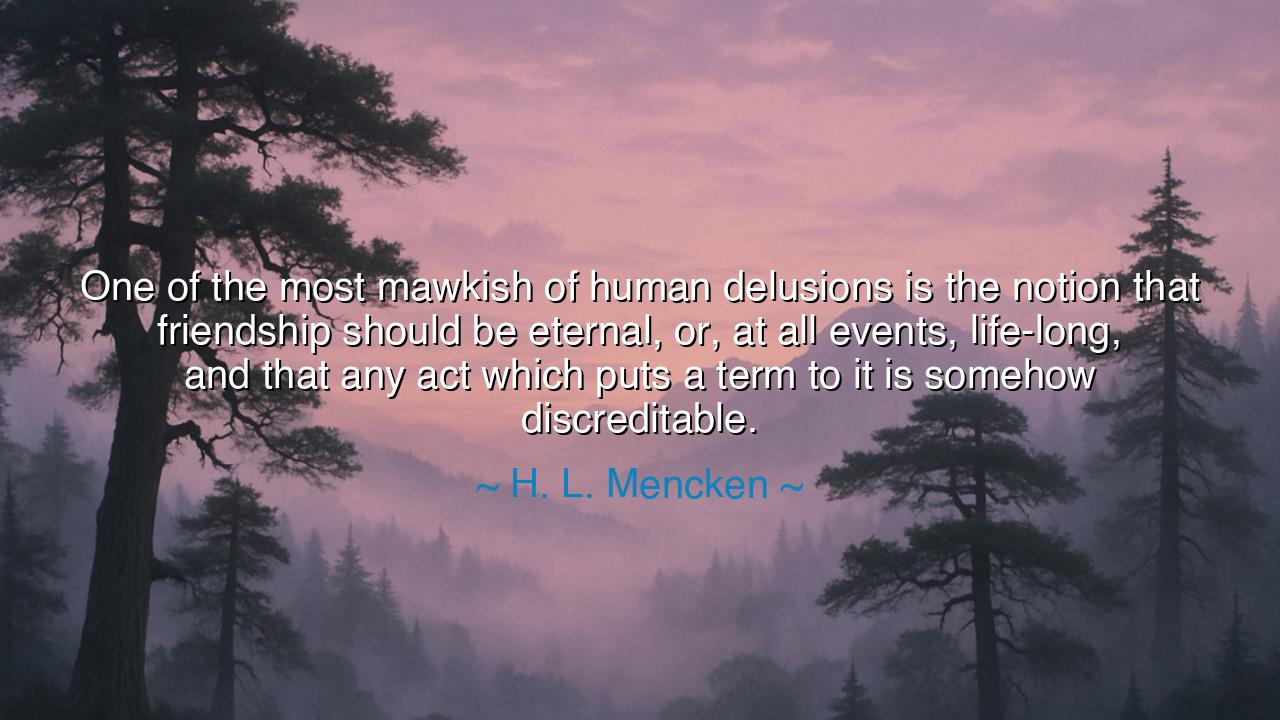
One of the most mawkish of human delusions is the notion that
One of the most mawkish of human delusions is the notion that friendship should be eternal, or, at all events, life-long, and that any act which puts a term to it is somehow discreditable.






"One of the most mawkish of human delusions is the notion that friendship should be eternal, or, at all events, life-long, and that any act which puts a term to it is somehow discreditable." Thus wrote H. L. Mencken, that sharp and unflinching observer of human folly, whose pen spared neither kings nor commoners. In this single sentence, he pierces through one of mankind’s sweetest illusions — that friendship, once formed, must endure forever, and that its ending is a betrayal rather than a natural passing. Mencken, realist and philosopher of the human condition, calls this belief “mawkish”, meaning sentimental to the point of blindness — a tender lie we tell ourselves to resist the truth of change.
In the world of the ancients, the sages often taught that all things move in cycles — birth and decay, dawn and dusk, union and separation. Friendship, too, follows this law of impermanence. It arises when two souls meet in harmony — sharing values, purpose, or circumstance — and it fades when those harmonies shift. Yet human beings, ever fearful of loss, cling to the illusion that what is good must also be eternal. Mencken reminds us that to demand permanence from the transient is to invite sorrow. Just as a flower withers after its season, even the dearest friendship may have its appointed time. To mourn its end is human; to call it shameful is folly.
This truth, though cold to the heart, is warm with wisdom. For friendship is not diminished by its impermanence; it is made sacred by its presence. Two souls who walk together for a time — whether for years or mere moments — exchange something eternal even when the bond itself fades. Think of Aristotle and Plato, teacher and student, who shared a friendship rooted in philosophy. When their ideas diverged, Plato’s idealism clashed with Aristotle’s realism, and their friendship waned. Yet neither was dishonored. Each carried forth what he had learned from the other and gave it to the world. The end of their companionship was not failure, but transformation — the passing of one light into another.
Mencken’s words also speak against the false morality that brands the ending of friendship as betrayal. Too often, men condemn one another when paths diverge — as if parting ways were proof of disloyalty. But the wise know that there are seasons for every bond. When growth leads two travelers to different roads, it is no disgrace to separate. The true dishonor lies in clinging to what has already ended, in pretending affection that no longer lives. To end a friendship honestly is not to destroy it, but to honor it as it was — pure, sincere, and complete in its time.
Consider the tale of Abraham Lincoln and William Herndon, law partners and friends in their early years. Together they shared ambition and philosophy, but as Lincoln’s destiny rose toward the presidency, their paths grew apart. Herndon later wrote critically of Lincoln, not from hatred, but from conviction. Their friendship, once strong, was not eternal. Yet history does not remember them as enemies — for their bond had already fulfilled its purpose: it had shaped Lincoln’s moral strength and Herndon’s understanding of greatness. Mencken would say that neither man failed the other; they simply obeyed the natural order — the ebb and flow of human connection.
To understand Mencken’s wisdom, one must abandon sentimentality and embrace acceptance. The end of friendship is not tragedy, but truth. People change, as rivers alter their course; ideals evolve, as mountains wear with time. What once bound two hearts may lose its force, not through betrayal, but through growth. To insist that friendship remain unchanged is to demand that the world itself stand still. Mencken invites us to look upon endings not as ruin, but as renewal — the moment when one story closes so another may begin.
Lesson: Do not measure friendship by its length, but by its sincerity. A brief friendship filled with truth and laughter is worth more than a lifetime of weary pretense. To release a friendship that has run its course is not to abandon love, but to respect its natural rhythm.
Practical action: When a friendship fades, let it go with gratitude, not bitterness. Speak kindly of those who once shared your journey, even if your paths have parted. Do not bind your heart with guilt for what time has undone. Instead, cherish what was good, learn from what was flawed, and open your spirit to new companions yet to come. For in the wisdom of H. L. Mencken, the end of friendship is not disgrace — it is simply life unfolding, as it always has, and always will.






AAdministratorAdministrator
Welcome, honored guests. Please leave a comment, we will respond soon